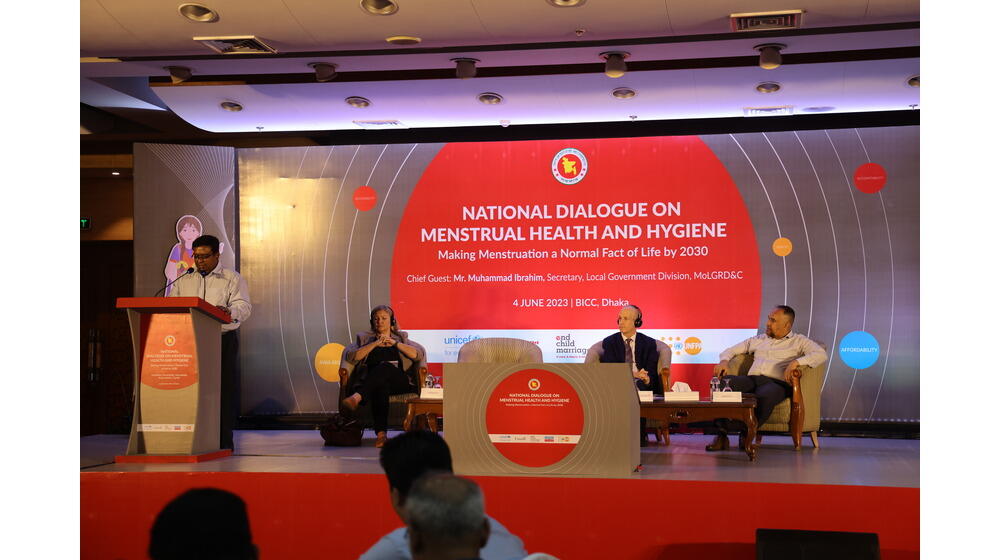Dhaka, 4 June 2023 - The National Dialogue on Menstrual Health and Hygiene was organized by the Local Government Division, Ministry of Local Government, Rural Development and Cooperatives, Government of the People's Republic of Bangladesh, in partnership with UNFPA, UNICEF, Global Affairs Canada and Menstrual Health and Management Platform. The event took place on June 4th, 2023 at Bangabandhu International Conference Center in Dhaka and brought together over 150 representatives from different stakeholders to accelerate the nation’s effort to eradicate menstrual poverty and protect the rights and dignity of women and girls.
The dialogue, which was attended by Mr. Muhammad Ibrahim, Secretary of the Local Government Division, Ministry of Local Government, Rural Development and Cooperatives (MoLGRD&C) as the Chief Guest, and Ms. Kristine Blokhus, UNFPA Representative, and Mr. Sheldon Yett, UNICEF Representative as Special Guests, focused on the theme of ‘Choice’. The discussion explored the availability, accessibility, affordability, and quality of menstrual products, education and accountability mechanisms. The dialogue provided an excellent platform for different stakeholders, including the government, development partners, civil society, media, and youth networks to delve into data, share results, progress, and challenges and the impact achieved by the country in the last decade.
During the dialogue, the participants discussed the urgent need for accelerated, concrete actions that are gender-transformative. They emphasised the importance of innovative financing, continuing the exemption of VAT, and potentially waiving other duties and taxes on importing raw materials, various types of menstrual products, and production and sales of menstrual products. Additionally, they also encouraged public-private partnerships to ensure that the burden on girls, women and their families is minimized.
The highlight of the event was when two adolescent girls shared their personal experiences, sparking a deep discussion about the real-life challenges that women and girls face. The discussion also delved into systemic barriers and root causes that perpetuate menstrual poverty in Bangladesh.
During the event, Ms. Kristine Blokhus, UNFPA Representative, stressed the significance of providing accurate information about menstruation, and reproductive health. She also emphasized the need to ensure the availability of menstrual products to empower girls in making informed decisions about their bodies, health, and well-being.
As the Chief Guest, Mr. Muhammad Ibrahim, Secretary, Local Government Division, MoLGRD&C, highlighted the significance of promoting menstrual hygiene management, providing sanitary pads in schools, and educating about menstrual health. He emphasized that these efforts foster inclusivity and empower women and girls to take charge of their well-being. Mr. Ibrahim also emphasized the need to create a stigma-free environment that encourages open discussions about women's natural cycles and their menstrual needs.
Menstrual health and hygiene are fundamental human rights essential for gender equality, education, and overall well-being. However, taboos, stigmas, and limited access to information and resources continue to pose significant challenges for millions of women and girls in Bangladesh. It is crucial to address these barriers and create an inclusive and supportive environment, and ensure full implementation of national strategies that are costed and fully funded. According to the National Hygiene Survey 2018, only 30-36% of women in Bangladesh were aware of menstruation before their first period.
During the event, Mr. Sheldon Yett, UNICEF Representative, stressed the importance of gender-separated toilets in schools to empower girls to manage their menstruation safely and without shame or fear. He stated that every girl must have access to safe period products as well as information about puberty and menstruation.
"Continuing the national dialogues each year with different dimensions is vital," stressed Mr. Masaki Watabe, UNFPA Deputy Representative, while summarizing the event. He emphasized the need to address multiple dimensions of menstrual health and tackle obstacles comprehensively. By keeping the conversation alive, we ensure that menstrual health remains a part of policy discussions and therefore everyday life in the community.
Providing women and girls with comprehensive education in all settings, adequate sanitation facilities, a choice of menstrual products, and an emotionally and physically supportive environment is essential to ensure safe and dignified menstrual experiences. The National dialogue on Menstrual Health and Hygiene will continue to serve as a platform for stakeholders to collaborate and share knowledge, with the aim of eradicating menstrual poverty in Bangladesh by 2030.


